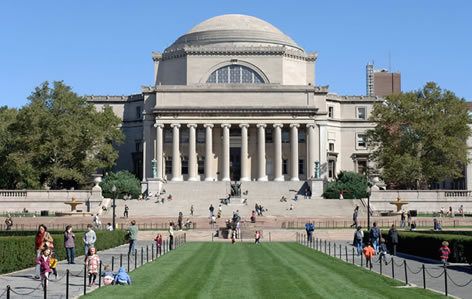Educational consultant and vetted college admissions counselor Mark Montgomery speaks about the importance of visiting a college you’re interested in attending. It’s vital to get a first-hand impression of the vibe of the student body. The way of life at the university, and anything else that differentiates it from other schools on your list.
TRANSCRIPT:
Today I’m on the campus of Hamilton College. Which is located in Upstate New York about an hour or so from Syracuse, New York. Beautiful, rural campus, about 2,000 or 2,200 students. Very historic Hamilton is named after Alexander Hamilton, the first director of the Federal Reserve Bank, the national bank. It has illustrious history. I’ve been taking the walking tour and of course, the focus is on all the historical significance of the campus as well as the people who have gone here.
Princeton, too, I was recently at Princeton. And that was what the admissions officer led with, was the fact that George Washington had used the campus, the ties with the historic roots of the United States. And certainly Hamilton has that in spades, too.
As I visit colleges, I am like most of my clients. I sometimes will do several in a week. And they do all tend to kind of run together at a certain point. It was interesting, at an information session at Princeton. Maybe two thirds of the way through, a father finally raised his hand and said, “So what makes Princeton different?” And of course, that’s what we all want to know, right?
Because the educational mission of these universities is virtually identical one to another. If you’re talking about a liberal arts institution, or even an institution that is — maybe it’s a university but has a liberal arts curriculum, how do you tell one from another?
One school on this trip that has done a really good job of that is Bates College. The admissions officer who was, interestingly, it was his first information session ever, and the admissions director was very personable. And he did a fantastic job of really explaining how Bates was different from its competitors. From places like Hamilton, which is one of its peer institutions. It was very clear he was able to differentiate Bates. But how does that help you as a student or a parent as you’re trying to differentiate among these colleges?
What’s Important to YOU?
I think, again, what’s important first is to figure out what is important to you. What are the things that matter? Hamilton is a residential college, everybody lives here, it’s in a rural location, and it’s far from any urban area. Certainly there are lots of outdoor activities to do and to participate in, athletics, and student life, there are about 25% of the students here who are in Greek life.
It’s also snowy here because of the lake effect of Lake Ontario, there’s maybe 100 to 120 inches of snow per year. While walking around the campus you can sort of get an inkling of that, the way things are kind of put together. But what’s really important to you? What are the departments that are important to you? Also, what are the kinds of people you want to go to school with?
What is the way of thinking that animates you? Once you have that, then you can begin to understand that Bard College is not the same as Hamilton. Not only do they not look alike, but the kinds of kids who go there are quite different. Same thing with Vassar versus a Colgate. Very different kind of campus community.
The Point of Visiting
Now, the campuses themselves are absolutely gorgeous. So why visit? Well, it’s helpful on the one hand, because you get a sense of the real estate on that particular day, whether it’s raining or sunny or snowy or whatever, but you get a sense of the real estate.
But the most important thing that you need to try to uncover as you’re visiting these campuses is the student vibe. Who are these kids that go here? What are their priorities? Not only while they’re here as students, but also after they graduate? What are their politics? What are the activities that really animate them?
So that’s tough. That’s tough to do in a day as you’re visiting a campus. So that’s why campuses, admissions offices, do welcome overnight visits, they welcome you to visit in a classroom. I always tell students, “Don’t evaluate the professors while you’re there, evaluate the students while you’re there.” Eating in the cafeteria can also be helpful, just to watch the people and see how are they dressed? How are they interacting? Are they interacting? What kinds of vibe you get from these kids.
Talk to Students
And then finally, and this the hardest thing to do, is to actually go and speak to people. Go talk to students, and ask their opinion about the vibe here and the activities and their kind of social scene and the priorities of students. Are they the kind who are really, really academically focused? That they really are passionate about their academic inquiry? Or are they really, really intelligent and driven to succeed, perhaps financially and professionally, and this is a school in which they can grow and expand and explore new things, but perhaps it’s just not as academic as others?
These things are difficult to discern. I make no apology for the difficulty of trying to get at this, and this is something of why people will hire an independent counselor, is to try to get a handle on that vibe.
Take-Aways
So as you’re visiting schools, yes, look at the real estate, do as I’m doing today, poking into buildings and exploring the history of the school. But ask yourself that question, “What is different about this place, if anything?” From the other schools that may be on your list? And doing so, take some time. Your first impression as you’re just wandering the campus may not be the most accurate.
Don’t judge a book by its cover, right? You need to see what’s inside. You can look at the buildings but you need to be able to try as hard as you can to get a picture of what the community is like at any particular college you visit.
So good luck, it’s hard, but do the self-examination first. Know who you are and what you seek, and then systematically go out and see if you can find that.
Mark Montgomery
Expert Educational Consultant

